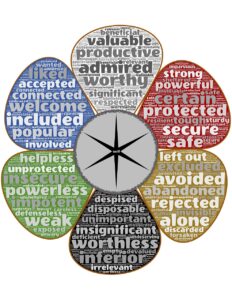TL;DR:
– Trust Issues in Relationships: Stem from past experiences, cheating, and insecure attachment.
– Impacts of Trust Issues: Lead to doubt, communication breakdown, and intimacy issues.
– Resolving Trust-Issues: Requires open communication, consistent actions, and potential professional support.
– Rebuilding Trust: Involves sincere apologies, transparency, and patience over time.
– Possibility of Rebuilding Trust: Depends on damage severity, willingness to change, and readiness to move on if needed.
Introduction
Trust issues can shake the very foundations of our relationships. If you’re grappling with these difficulties, you’re not alone. As a seasoned wellbeing & self-improvement expert and relationship advisor, I’ve helped many navigate through such matters. In this article, ‘Trust Issues: 6 Proven Methods to Rebuild Trust in Relationships’, I’ll share robust strategies that have effectively restored trust in numerous relationships. Dive in to discover how you can rebuild lost trust and strengthen your relationship’s foundation.
Addressing Trust Issues
Ever wondered why the level of trust in your relationships is decreasing? Trust plays a pivotal role in any relationship. Dealing with trust issues can be a daunting task but rest assured, it is not impossible.
Understanding Trust Issues
Trust issues brew when confidence in people or outcomes dwindles. Common signs include constant suspicion, lack of emotional intimacy, or history of broken promises. Trust-issues originate from past unpleasant experiences or trauma that makes people skeptical towards trusting others. Recognizing these symptoms early helps take the necessary steps to address and resolve these issues.
Approaching Trust Issues
Overcoming trust issues requires effort at cognitive, emotional, and behavioral levels. Some practical steps to consider include:
- Communication: Transparent and frequent communication helps bridge the trust deficit.
- Patience: Building trust is a gradual process. It needs time and consistent behavior.
- Professional Help: If issues persist, seeking help from a trusted professional counselor or therapist would be beneficial.
Building Trust Again
Trusting again involves unlearning old behaviors and adopting new ones that foster trust. Practicing empathy, being consistent in actions, and displaying emotional support are key elements to restore lost trust. It might be a long journey, but with the right mindset, it’s definitely doable.
In the world of relationships, trust plays a crucial role. It not only determines the strength of contact but also affects our overall well-being and self-improvement. Hence, effectively addressing trust-issues is essential to ensure healthy relationships and personal growth. For more insights on trust, visit this reputable piece by Psychology Today.
Trust Issues: A Major Hurdle in Relationships
Did you know that trust is the cornerstone of every successful relationship? Yes, this vital aspect largely determines the health, stability and durability of our relationships. However, trust issues frequently pose huge obstacles in fostering deep and meaningful connections.
The Problem of Trust Issues
Trust issues could either stem from past disappointments or the fear of potential betrayal down the line. It generated an insecure feeling which impairs the free flow of love, understanding and mutual respect needed to anchor a successful relationship.
Your Solution to Trust Issues
But worry no more. Overcoming trust-issues require understanding, patience and consistency. You can cultivate trust by building open communication, demonstrating reliability through actions, practicing forgiveness and seeking professional help when necessary.
The journey to trusting people may seem complex, but these strategies are proven techniques to help you overcome your fear of betrayal. Remember, trust is a choice that can be made daily and practice brings improvement.
How Trust Building Nurtures Healthy Relationships
Trust forms the basis for collaboration, conflict resolution, and mutual respect. In relationships characterized by trust, partners feel safe, secure and satisfied. Sounds dreamy, right? Well, it’s entirely achievable.
Interestingly, research from the American Psychological Association links high levels of trust to improved physical health, lower stress levels and increased life satisfaction. Thus, trust-building not only improves your relationships but also contributes significantly to your overall well-being and self-improvement.
Professional Help: The Role of a Relationship Advisor
Struggling with trust issues? A relationship advisor might come in handy! An advisor can help you explore your feelings, examine past experiences and develop practical strategies to resolve trust issues. Guided by professionals like [Esther Perel](https://www.estherperel.com/), a renowned relationship therapist, you can start rebuilding trust in your relationships once more.
Remember, overcoming trust issues is possible and vital for lasting relationships. Trust in the process and see the transformation unfold.
Conquering Trust Issues in Relationships
Are you struggling with trust-issues? If so, you’re not alone. Trust is a vital part of every healthy relationship, but building and maintaining it can be challenging. However, knowledge is power. Getting a comprehensive understanding about it can lead you to a path towards healing in your relationships.
Understanding Trust Issues
Trust issues can stem from past traumas or experiences, and they often lead to anxiety, fear, and doubt in relationships. These feelings can overshadow the love and happiness shared among partners. Constant questions, scrutinizing every action, and incessant worry can become the everyday ‘norm’. But remember that trust issues are not about the believed ‘untrustworthiness’ of the partner, but more a reflection of the individual’s own fears and insecurities.
Working Through Trust Issues
Working on trust-issues requires patience and determination. Some key strategies include:
- Open and honest communication: This involves conveying your fears and insecurities and also listening and understanding your partner’s perspective.
- Seek professional help: An experienced therapist or relationship advisor can provide invaluable insights and tools for managing and overcoming trust issues.
- Practice mindfulness: Embracing and practicing mindfulness can help you stay present, thus reducing anxiety and fear.
Building and Rebuilding Trust
Building or rebuilding trust takes time and consistency. Commit to being reliable, kind, and open in your interactions. Let your actions prove your words, and be patient with yourself and your partner. Celebrate small steps and victories, and consider reading books on relationship building for additional guidance.
Remember that trust is not a fixed trait; it’s a characteristic that can grow and strengthen with time, effort, and dedication. Conquering trust issues is possible, and the journey towards a healthier relationship starts with a step towards understanding and seeking help.
Understanding Trust Issues
Trust issues are common problems in relationships, altering the dynamics between individuals. They’re not only linked to romantic relationships, but also friendships, family relationships, and professional associations. But what exactly are trust issues, and how can they be resolved?
Identifying Trust Issues
Trust issues in relationships often stem from past traumas or experiences. They can manifest in different ways such as jealousy, doubts, controlling behavior, or avoiding intimacy. Recognizing these signs is the first step towards tackling trust-issues.
Overcoming Trust Issues
It’s essential to approach trust-issues with empathy, understanding, and patience. Here are some strategies:
– Open communication: Express your feelings and fears openly and honestly. Remember, it’s okay to be vulnerable.
– Seek professional help: A relationship advisor or therapist can provide objective advice and coping strategies.
– Time and patience: Building or rebuilding trust doesn’t happen overnight. It requires time, consistency, and effort.
In order to effectively enter a life of better quality relationships and personal happiness, tackle and overcome your trust-issues. By understanding the root causes and applying strategic solutions, you can work towards building stronger, healthier, and more satisfying relationships.
For further help understanding trust-issues, you might want to read this article from Psychology Today or consult professional relationship advisors at Relate.
Understanding and Overcoming Trust Issues
Have you ever questioned the reliability of your partner or perhaps a friend? Well, you’re not alone. Trust issues can lead to multiple problems in relationships and your personal life overall.
The Origin of Trust Issues
Presumably, trust issues may arise from past disappointments or experiences that stained our perception of people and shape how we form relationships. This could be a result of personal trauma, bad experiences with ex-partners, toxic friendships, or even family history. It’s important to recognize these origins of distrust as the first step towards overcoming the problem.
How Trust Issues Affect Relationships
Trust issues can be an enormous obstacle in relationships, leading to incessant doubts, insecurity, and a constant need for reassurance. When trust is lacking, it can create discomfort and disconnection, and in worst cases, contribute to emotional abuse.
Ways to Overcome Trust Issues
Overcoming trust-issues requires both self-improvement and the desire to build healthier relationships. Here are some strategies:
- Seek professional help from a relationships advisor
- Practice self-awareness
- Open up about your feelings
- Learn to forgive and let go
Remember, overcoming trust-issues is no easy feat. It would require dedication, patience, and a lot of self-love. However, with professional guidance and a strong support system, overcoming these obstacles is indeed achievable.
Understand that this journey of overcoming trust-issues is part of your wellbeing and self-improvement journey. It’s okay to seek help from professionals like a relationship advisor. You can book a session with them from online platforms like linkhere.com to start this journey.
Trusting again after Trust Issues
The most challenging part perhaps, is regaining trust after it has been shattered. This is a gradual process involving acknowledgment and forgiveness. Involve patience, understanding, and open communication in your journey.
Remember, recovering from trust-issues can take time. The process can be painful and challenging, but it’s a worthwhile journey in the end. This article will provide you with more insight and practical advice.
Conclusion:
In the intricate dance of relationships, rebuilding trust after experiencing trust-issues is a delicate yet rewarding journey. By embracing empathy, communication, vulnerability, consistency, accountability, and patience, individuals can foster a foundation of trust that transcends challenges. Trust issues can be formidable barriers, but with dedication and mutual effort, they can be surmounted. As you navigate the realm of trust-issues, remember that understanding, acceptance, and growth pave the way to stronger, more resilient connections. Dive deeper into the realm of Trust-Issues to uncover valuable insights and strategies for nurturing trust in your relationships.













